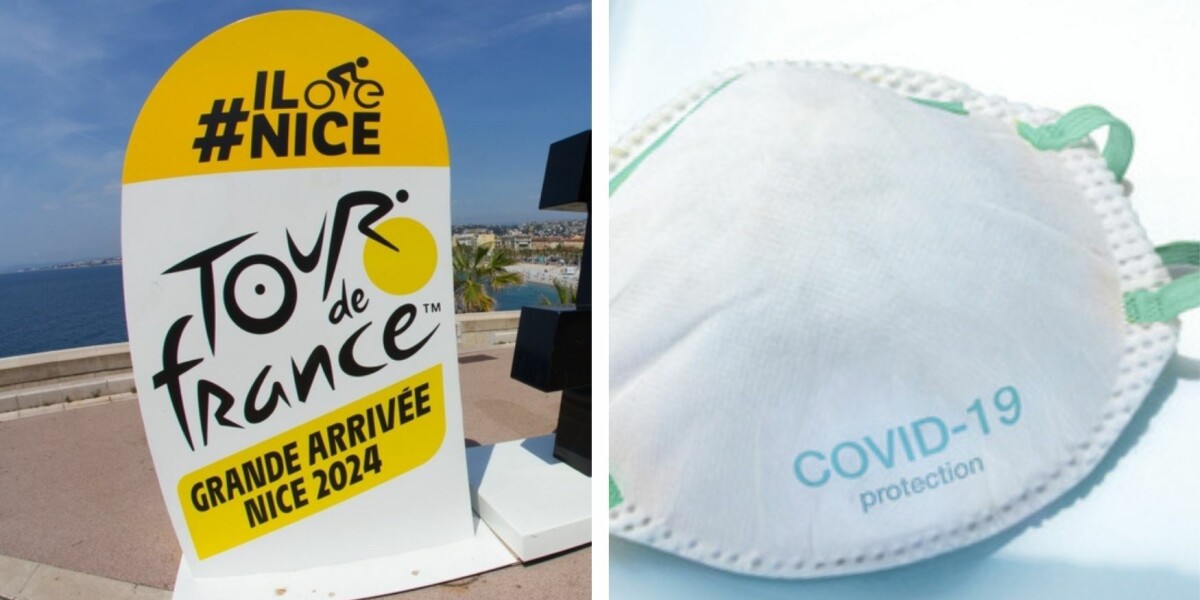
Covid: masks return for tour de france after cyclists test positive
- Select a language for the TTS:
- UK English Female
- UK English Male
- US English Female
- US English Male
- Australian Female
- Australian Male
- Language selected: (auto detect) - EN
Play all audios:

PLUS: WHAT IS THE CURRENT COVID SITUATION IN FRANCE? Masks and other protection measures are now required for anyone involved in the Tour de France after several riders tested positive for
Covid in the past few days. Anyone in contact with the riders of the famous race - including organisers, journalists, and other guests - must now wear a mask and take other measures to
protect the riders and the members of the cycling teams, said organisers the Amaury Sport Organisation (ASO). It comes after British rider Tom Pidcock and Spanish rider Juan Aysuo tested
positive for Covid and were forced to abandon the race. > A disappointed Tom Pidcock will not line up for stage 14 of the Tour > de France today. > > Tom is experiencing
symptoms of Covid-19 and under advice from our > medical team will now return home to recover. > pic.twitter.com/tFRhhG9hrW > — INEOS Grenadiers (@INEOSGrenadiers) July 13, 2024
Slovenian rider Tadej Pogacar (Mr Aysuo’s teammate and yellow jersey wearer) said he had contracted Covid in mid-June, while Tour de France 2018 winner, Welsh rider Geraint Thomas, said he
was continuing to race despite suffering from “light symptoms”. Another rider, Belgian Remco Evenepoel, has even started wearing a mask while riding because, he says, journalists around him
have not been wearing one. Read also: Why are Tour de France cyclists called 'runners' in French? Read also: Seven key French expressions to help you understand Le Tour de France
The Tour de France is now well underway, with Mr Pogacar winning the most recent stage (the 14th), Plateau de Beille on July 14, finishing more than a minute ahead of Danish rider Jonas
Vingegaard. The Slovenian is also ahead in the general classification, with Vingegaard just over three minutes behind. Read also: Tour de France 2024: day-by-day route tracker Read also:
Baffled by the Tour de France rules? Read these four points The Tour is set to end in Nice on July 21. It is not ending on the Champs-Elysée this year (in contrast to its usual finish) in
order to avoid clashing with the Paris Olympics, which begin on July 26. WHAT IS THE CURRENT COVID SITUATION IN FRANCE? France has been experiencing a general rise in Covid nationwide over
the past few months - with the new ‘FLiRT’ variant thought to be behind the spike in cases (although Santé publique France has now said that cases are stabilising and even dropping
slightly). The FLiRT variant is now dominant globally, especially in the United States and Australia. This strain emerged from the JN.1 subvariant, and other strains in the same ‘family’
include KP.3 and KW.1.1. In an update dated July 12, 2024, SPF reiterated: “Numerous variants of SARS-CoV-2 are circulating in France and new variants carrying mutations are regularly
identified.” However, in its most recent Covid-19 bulletin (July 10, 2024), SPF said that “indicators remain stable in hospitals” and that cases now appear to be dropping slightly, judging
by official PCR test results from hospitals and testing labs, and used water analysis. Up to July 10, the number of emergency hospital visits for suspected Covid were at 1,929 (0.6% of the
total emergency visits, SPF said, the same as the percentage the week before). Of these, 715 were admitted to hospital for confirmed Covid (1.1% of total hospitalisations, down from 1.3% the
week before). ‘REMAIN ALERT’ While the Institut Pasteur in France has said that “30-60% who carry the virus, especially young people, are asymptomatic,” people are still warned to remain
alert to the symptoms of Covid in general. Read also: Adult vaccines in France: check here that you are protected Vulnerable people - including the very young, elderly, pregnant; those with
long-term conditions, or the immunocompromised - are warned to remain especially alert and to consult a doctor as soon as possible in case of symptoms. People are also reminded to keep
Covid vaccinations and boosters up to date with vaccination still the best protection against infection and severe illness, says the Assurance maladie.
